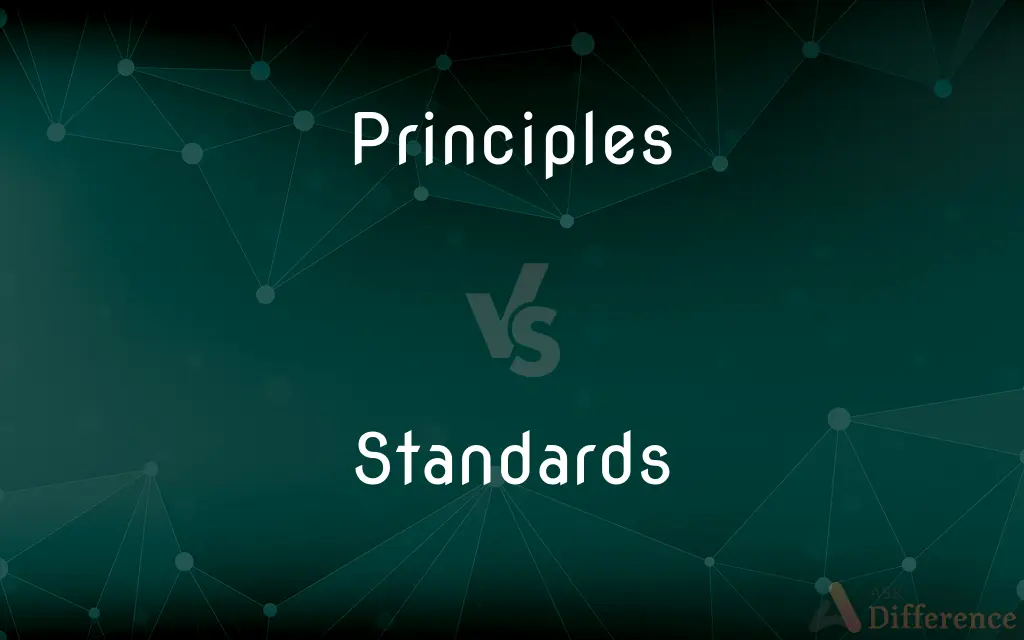Principles vs. Standards — What's the Difference?
By Tayyaba Rehman — Published on January 6, 2024
Principles are fundamental beliefs or ethics that guide behavior, while standards are established levels of quality or norms used as measures or models.

Difference Between Principles and Standards
Table of Contents
ADVERTISEMENT
Key Differences
Principles refer to core beliefs or values that provide guidance for behavior and decision-making. Standards, on the other hand, are defined benchmarks or norms that serve as a reference for measuring quality or performance.
Principles are often more abstract and subjective, rooted in ethics and morals, influencing how individuals or organizations choose to act. Standards are more concrete and quantifiable, providing a clear, objective criterion for evaluating outcomes or processes.
Principles tend to be more enduring and less susceptible to change, as they are based on fundamental truths or ideologies. In contrast, standards can be updated or modified as new methods, technologies, or information become available.
Principles often serve as the foundation for developing standards. The values and beliefs encapsulated in principles can guide the establishment of standards to ensure they align with ethical or quality expectations.
While principles are about 'why' and 'what' we believe in, standards are about 'how' to achieve or measure those beliefs in practical terms, often used in professional and industry contexts.
ADVERTISEMENT
Comparison Chart
Nature
Abstract, ethical beliefs
Concrete, measurable benchmarks
Flexibility
Generally enduring and less changeable
More adaptable and subject to change
Purpose
Guide behavior and decision-making
Provide criteria for quality or norms
Origin
Rooted in personal or societal values
Established by authorities or experts
Application
Broad and subjective
Specific and objective
Compare with Definitions
Principles
Principles are core values or beliefs that guide actions.
Honesty is a principle that leads her to always speak the truth.
Standards
Standards are established norms for measuring quality or performance.
The new safety standards require all equipment to be inspected regularly.
Principles
Principles are ethical standards that drive moral judgments.
His principle of compassion influences him to help those in need.
Standards
Standards are authoritative models or examples for replication.
The industry standards for data encryption ensure secure communication.
Principles
Principles are fundamental truths serving as the foundation for behavior.
The principle of fairness dictates that everyone should have equal opportunities.
Standards
Standards are benchmarks set for consistency and excellence.
The hotel adheres to high standards of cleanliness and guest service.
Principles
Principles are guiding beliefs that inform decision-making.
The principle of respect for others governs how he interacts with colleagues.
Standards
Standards are criteria for evaluating or comparing objects or processes.
The educational standards dictate the minimum qualifications for teachers.
Principles
Principles are basic doctrines or ideologies that shape attitudes.
The principle of sustainability guides her to make environmentally friendly choices.
Standards
Standards are formal requirements set by organizations or bodies.
The building standards mandate specific materials for construction.
Principles
A basic truth, law, or assumption
The principles of democracy.
Standards
Serving as or conforming to an established or accepted measurement or value
A standard unit of volume.
Principles
A rule or standard, especially of good behavior
A man of principle.
Standards
Widely recognized or employed as a model of authority or excellence
A standard reference work.
Principles
The collectivity of moral or ethical standards or judgments
A decision based on principle rather than expediency.
Standards
Acceptable but of less than top quality
A standard grade of beef.
Principles
A fixed or predetermined policy or mode of action.
Standards
Normal, familiar, or usual
The standard excuse.
Principles
A basic or essential quality or element determining intrinsic nature or characteristic behavior
The principle of self-preservation.
Standards
Commonly used or supplied
Standard car equipment.
Principles
A rule or law concerning the functioning of natural phenomena or mechanical processes
The principle of jet propulsion.
Standards
(Linguistics) Conforming to models or norms of usage admired by educated speakers and writers
Standard pronunciation.
Principles
(Chemistry) One of the elements that compose a substance, especially one that gives some special quality or effect.
Standards
An acknowledged measure of comparison for quantitative or qualitative value; a criterion.
Principles
A basic source. See Usage Note at principal.
Standards
An object that under specified conditions defines, represents, or records the magnitude of a unit.
Principles
Plural of principle
Standards
The commodity or commodities used to back a monetary system.
Standards
The set proportion by weight of gold or silver to alloy metal prescribed for use in coinage.
Standards
A degree or level of requirement, excellence, or attainment
Their quality of work exceeds the standards set for the field.
Standards
Something, such as a practice or a product, that is widely recognized or employed, especially because of its excellence.
Standards
A set of specifications that are adopted within an industry to allow compatibility between products.
Standards
A requirement of moral conduct
The standards of polite society.
Standards
The ensign of a chief of state, nation, or city.
Standards
A long, tapering flag bearing heraldic devices distinctive of a person or corporation.
Standards
An emblem or flag of an army, raised on a pole to indicate the rallying point in battle.
Standards
The colors of a mounted or motorized military unit.
Standards
Chiefly British A grade level in elementary schools.
Standards
A pedestal, stand, or base.
Standards
The large upper petal of the flower of a pea or related plant. Also called banner, vexillum.
Standards
One of the narrow upright petals of an iris.
Standards
A shrub or small tree that through grafting or training has a single stem of limited height with a crown of leaves and flowers at its apex.
Standards
(Music) A composition that is continually used in repertoires
A pianist who knew dozens of Broadway standards.
Standards
Plural of standard
There is some sign of disparate standards bodies becoming more closely aligned.
Standards
Principles of conduct shaped by one's ideas of morality, decency and honor.
Common Curiosities
What defines a principle?
A principle is a fundamental belief or value guiding actions and decisions.
Are standards universally applicable?
Some standards are universal, while others are specific to industries or regions.
How do principles affect behavior?
Principles influence behavior by providing ethical or moral direction.
Can principles change over time?
Principles are generally enduring, but they can evolve with societal changes.
Can an individual have their own principles?
Yes, individuals develop personal principles based on their beliefs and experiences.
Why are standards important in professional fields?
Standards ensure quality, safety, and consistency in professional practices.
Do standards restrict creativity?
Standards provide guidelines, but they can be flexible to allow for creativity.
Is it possible to measure principles?
Principles are abstract and harder to measure compared to concrete standards.
How do principles impact organizational culture?
Organizational culture is often shaped by the principles it upholds and promotes.
How do standards influence consumer expectations?
Standards set the baseline for what consumers expect in terms of quality and performance.
How are standards created?
Standards are created by experts or authoritative bodies to establish benchmarks in various fields.
How do principles and standards interact in decision-making?
Principles provide the ethical basis, while standards offer the practical framework for decision-making.
Do standards evolve over time?
Yes, standards evolve with advancements in technology and knowledge.
Are standards legally binding?
Some standards are legally binding, while others are voluntary guidelines.
Can principles conflict with each other?
Yes, individuals can face dilemmas when their principles conflict.
Share Your Discovery

Previous Comparison
Website vs. Portal
Next Comparison
Julia vs. PythonAuthor Spotlight
Written by
Tayyaba RehmanTayyaba Rehman is a distinguished writer, currently serving as a primary contributor to askdifference.com. As a researcher in semantics and etymology, Tayyaba's passion for the complexity of languages and their distinctions has found a perfect home on the platform. Tayyaba delves into the intricacies of language, distinguishing between commonly confused words and phrases, thereby providing clarity for readers worldwide.












































